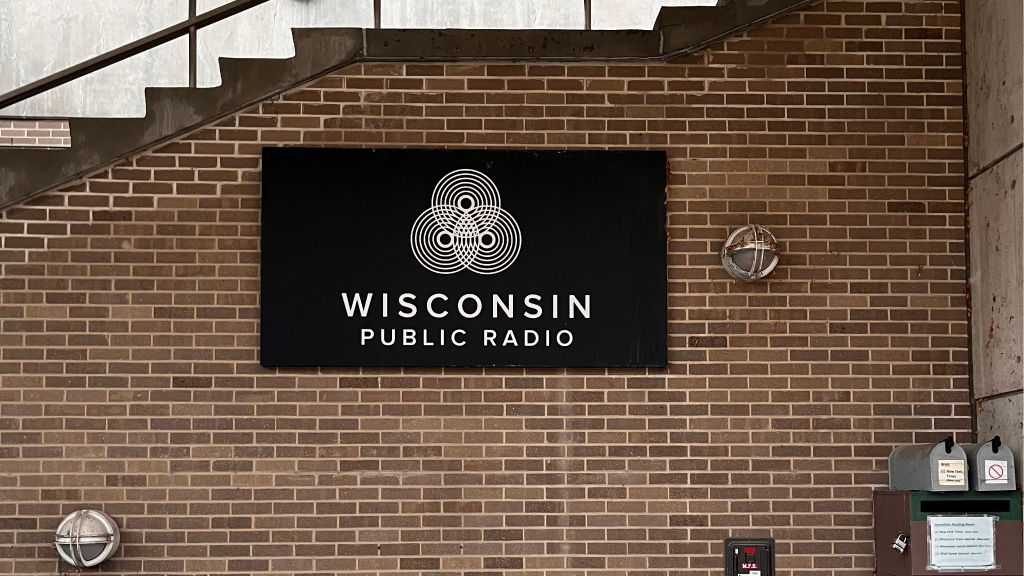WPR Lays Off Staff, Cuts Programs
Wisconsin Public Radio faces budget shortages, potential federal cuts.

A Wisconsin Public Radio sign hangs outside Vilas Hall on the UW-Madison campus. Anya van Wagtendonk/WPR
Amid ongoing budget shortages and facing potential federal funding cuts, Wisconsin Public Radio has notified at least 15 staff members that they will be laid off.
Four radio programs, including the nationally syndicated “To the Best of Our Knowledge,” will also end, in what WPR Director Sarah Ashworth described in a Friday letter to sustaining members obtained by WPR as an attempt to address “multiple challenges” and an “urgent need to adapt our services.”
WPR leadership referred all media requests to the University of Wisconsin-Madison, a parent organization for WPR. Representatives from UW-Madison referred to a public release from WPR.
A person with direct knowledge of the staff reductions, who asked not to be named because they were not authorized to share information publicly, said 15 full-time positions had been cut and that the organization is additionally not filling several vacancies.
In addition to “To the Best of Our Knowledge,” two other nationally syndicated shows — the arts and culture show “BETA,” and the health show “Zorba Paster On Your Health” — will end this autumn, as will the local “University of the Air,” Ashworth wrote.
“We are making these decisions to address multiple challenges — increased expenses, flat revenues, potential funding cuts, and the urgent need to adapt our service to meet audiences’ habits and needs,” Ashworth wrote.
WPR leaders held an informational meeting Friday afternoon, after affected staff was notified. Participants in the meeting described the mood as “somber.” One employee described the meeting as a question-and-answer session but said leadership did not respond to all questions. That employee described the meeting as “disappointing.”
Founded as 9XM, WPR is the oldest public radio station in the nation. It is co-held by the Universities of Wisconsin and the Educational Communications Board, both state agencies.
WPR is among the hundreds of public media organizations facing the possibility of reduced federal funding.
Congress has taken up a proposal to rescind previously allocated federal funds for the Corporation for Public Broadcasting, which distributes that money to local stations around the country.
The U.S. House of Representatives voted earlier this month to rescind $1.1 billion from CPB; the U.S. Senate has until mid-July to follow suit in order for the cuts to be made law.
About 4 percent of WPR’s budget comes from that federal source.
But WPR’s budget troubles predate those moves in Washington. The prospect of layoffs at the organization was publicly reported in May, and there is a planned merger between WPR and PBS Wisconsin, both part of the Division of Public Media. Multiple employees said that the prospect of layoffs was first raised almost a year ago.
Staff at PBS Wisconsin, which also receives CPB funding, were not laid off Friday.
Public radio listenership dropped during the COVID-19 pandemic as consumer preferences and habits changed, and it has not recovered. More broadly, broadcast radio consumption as a whole has shifted dramatically in recent years as more Americans turn to on-demand and streaming options.
In her letter, Ashworth alluded to those changes.
“To continue to meet our public service mission, we must align our resources towards serving Wisconsin,” she wrote. “The changes we’re announcing today will ensure that we continue to be a vital community resource for everyone in our state.”
“Layoffs and ending programs are never our first choice,” she added.
Editor’s note: This story has been updated to correct that WPR is part of UW-Madison.
Disclosure: This story was reported by WPR’s Anya van Wagtendonk and edited by Interim Assistant News Director Rob Mentzer. No member of Wisconsin Public Media’s senior leadership reviewed this story before publication.
Citing budget concerns, WPR lays off staff, cuts programs was originally published by Wisconsin Public Radio.
If you think stories like this are important, become a member of Urban Milwaukee and help support real, independent journalism. Plus you get some cool added benefits.


















Sad that proper institutions go through this, while the ones spreading misinformation can’t stop growing and expanding their reach.
they are a wonderful resource and I regularly listened to those programs